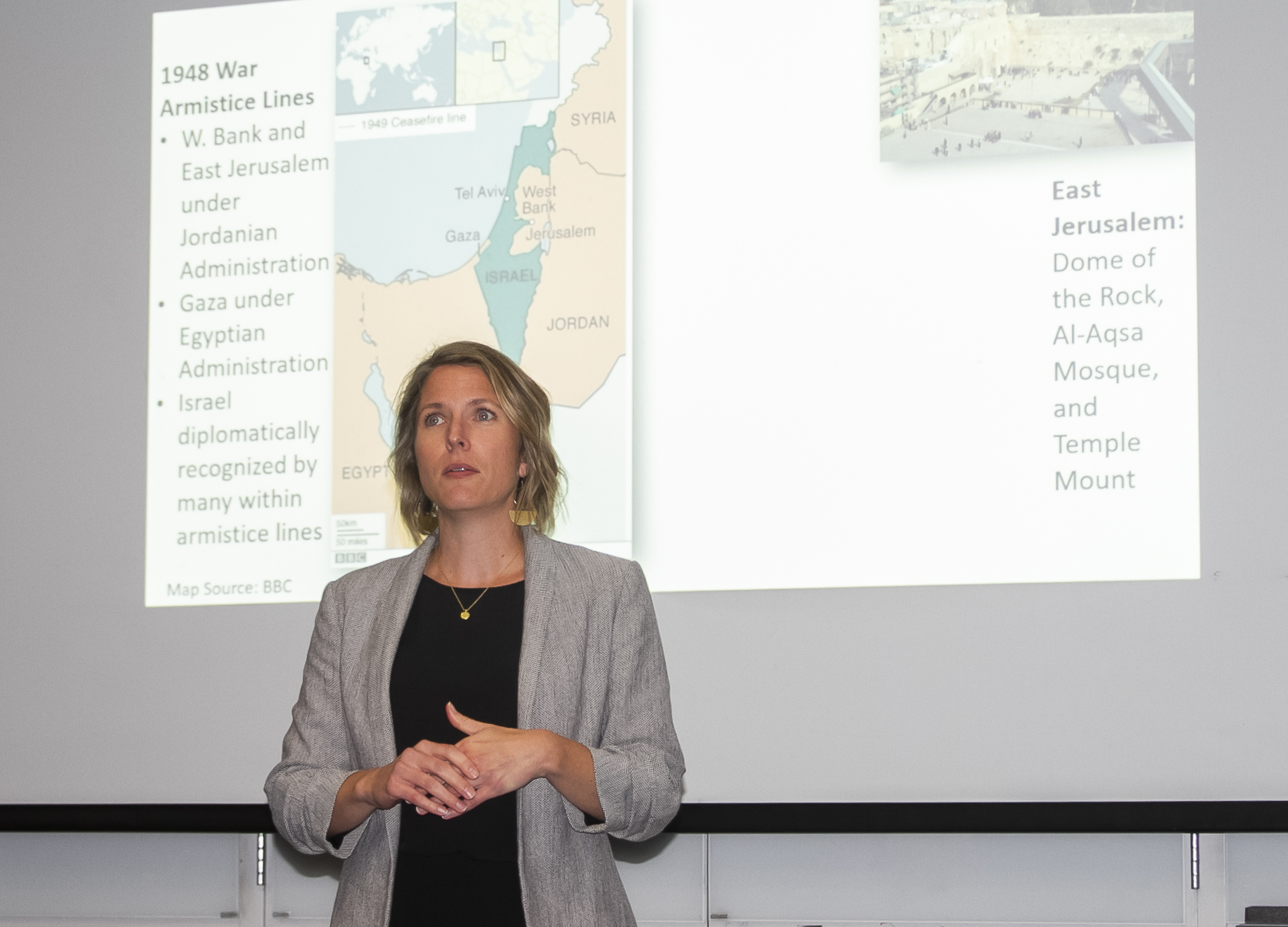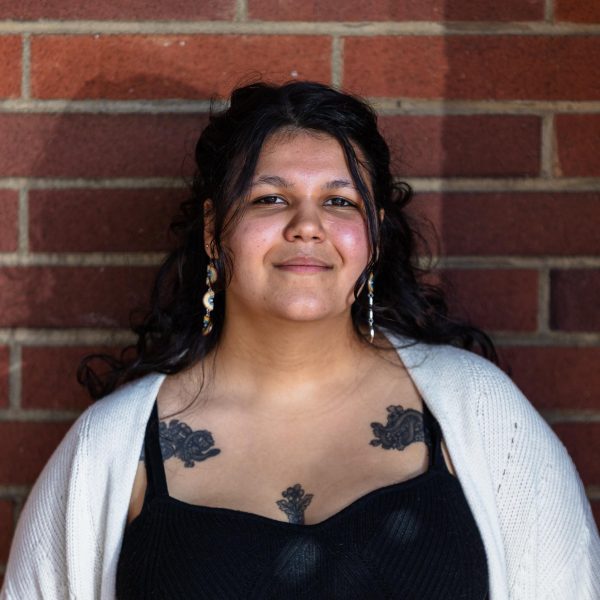
On Oct. 4, a panel was held in Eaton Hall about the humanitarian medical crisis in Gaza with Yousef Aljmal and Dr. Alice Rothchild. So when the Palestinian militant group Hamas breached the Gaza-Israel border three days later, the news brought a perturbed sense of urgency to respond.
In the two weeks since Oct. 7, the war and the humanitarian crisis in Gaza have intensified. University campuses across the United States have experienced polarizing reactions. Statements have been made, sides have been taken and clashes have broken out.
Faculty at Seattle Pacific University felt called to answer. Beginning Oct. 17, three consecutive events were organized, the first being from SPU’s Department of Theology.
On Tuesday, Oct. 17, professors Bo Lim, Brian Lugioyo, Tim Dearborn, Kerry Dearborn and Katie Douglass spoke on a panel titled “Prayers for Peace and Theological Meditations on Israel and Palestine,” hosted at First Free Methodist Church.
Dean of the School of Theology Dr. Brian Lugioyo facilitated Tuesday’s event. The time was intended to respond as a Christian university to the crisis with a posture of empathy and lament. Each speaker only had nine minutes allotted, but in brevity, the speakers spoke about peace.
“All three of them were presenting perspectives from Christians, rooted in a Christian theology around the situation. It wasn’t necessarily a Palestinian view. It wasn’t necessarily a Jewish view,” Lugioyo said. “It was Christians negotiating this now with limited time.”
For what is a geopolitical conflict, context ties the calling of SPU to faith and inter-faith. Lim examined the theological and eschatological roots of Christian Zionism; the Dearborns spoke of their partner organizations building bridges between Israelis and Palestinians; Kerry Dearborn shared scripture and meditations on lament, loving ones enemies and imago Dei.
“One of the things we were trying to do is be mindful of the different perspectives and be able to love well and tell well and continue to keep on understanding that there is… no ‘immaculate perception.’ We’re always hearing incomplete stories, but we want to do as best as we can for the best picture possible,” Lugioyo said.
Tim Dearborn, former Dean of the Chapel, recognizes that there is a strong variety of positions among Christians. He is a board member of Musalaha, a non-profit that seeks to train and teach reconciliation between Israelis and Palestinians.
“From my perspective, the events of two weeks ago have simply taken the veil off on what’s always been there,” Dearborn said. “I think that the role of a Christian university is to help people both understand the issues with their head but also with their heart and understand with empathy.”
Dearborn has been to Gaza two times for humanitarian work. He calls the war an unveiling because the conflict between Israelis and Palestinians is not new. History happens in context.
The subsequent event took place a day later on Oct. 18 in Demaray Hall. Associate Professor of History Rebecca Hughes and Assistant Professor of History Alissa Walter represented the history department in their panel titled “Understanding Israel/Palestine: The Current War in Context.” The room brimmed with listeners, nearly full.
Walter prefaced the conversation with empathy, explaining that the information presented would be intended to foster and encourage understanding from multiple perspectives. Hughes then discussed how the Holocaust underscored the urgent need for a Jewish homeland, garnering sympathy and backing from the international community for the creation of an Israeli nation-state.
“Context is essential because otherwise, we’re not going to be able to understand people’s backstory. And so we need to know the backstory of why Israelis respond to the violence in ways that seem and are in ways incommensurate to the violence that they have received. So much of that comes out of the Holocaust,” Hughes said.
Walter spoke on the occupation of Palestine and the salient moments that led to Hamas’s attack 2 weeks ago. She discussed the displacement of Palestinians, the 1948 Arab–Israeli War, Israeli settlements, the building and breaking of peace agreements after the Oslo Accords and the rise of Hamas.
Fifth-year English major Taylor Vanlanduyt appreciated the history as a backdrop to understanding today’s current conversations.
“I think it puts us in a specific posture. We got Dr. Hughes’s perspective on the Jewish nationalist side and then Dr. Walter breaking down both [perspectives] but focusing more on the Palestinian perspective,” Vanlanduyt said. “It allows us to be more well-versed on both sides and ask questions.”
Since Hamas’ initial offensive and Israel’s retaliation, the latest casualty figures show that almost 4,600 people have been killed in Gaza, and in Israel, almost 1,400 people have been killed.
Aljmal, who spoke at SPU on Oct. 4, disclosed that he lost nine family members when Israeli warplanes attacked a residential building in Al-Nuseirat refugee camp.
To understand and appraise the information received, the third and final event of last week was hosted by Assistant Professor of Communication Sara Shaban titled “Media Narratives and Misinformation” in Demaray Hall. It was intentional that this conversation happened after the historical context.
“To understand the conversations that are happening within the news media and social media, you have to have that historical context because without understanding historical context, it can be very easy to be manipulated by the things that are being reported,” Shaban said.
Shaban defined misinformation and disinformation. Misinformation is mistakenly reported false information, and disinformation is information meant to deceive for profit or political gain. As coverage of the conflict in Gaza rapidly proliferates and disseminates, false news threatens public perceptions of truth. The reader must know how to interpret information.
Shaban also introduced the SIFT acronym to spot: Stop, Investigate the source, Find better coverage, Trace to the original.
Junior political science major Tobias Thomason visited the West Bank during an ROTC internship this past August and attended Thursday’s event to gain media literacy.
“SIFT, that was something that we learned – ways to help us understand how to first process slowly. Coming into this conference, I [didn’t] know how to process all the information we get. Everything is fast, and sometimes, where I come from, you have to get information fast. But it was kind of a step back [to] sort of think,” Thomason said.
Amid the disheartening and often distressing news of conflict and war, taking a deliberate step back from news media and social media can be a necessary act. The constant barrage of images, narratives and opinions can, at times, overwhelm and desensitize.
“If something is in front of you all the time, it can be hard to see the forest through the trees at that point. So taking a step back, talking to other people I think can be very helpful,” Shaban said. “Also taking the time to grieve and lament is very important right now.”
The news portrays college campuses as divisive places; however, throughout SPU’s recent conversations, the common thread of empathy held together encouraging conversations and community in hardship.
“I’ve been really encouraged by the tone of the conversations, the substance of questions from students. I’ve seen really modeled already, thoughtful and empathetic and curious reactions. There’s headlines right now about things going very differently on other campuses, and I’ve been heartened that we’ve so far found a way through some of the polarization,” Walter said.
The conversation cannot end as long as the conflict is still going on. As SPU continues to process and grieve, it happens together.
“While we can’t fully understand where someone else is, I think we have to try,” Hughes said.

















































































